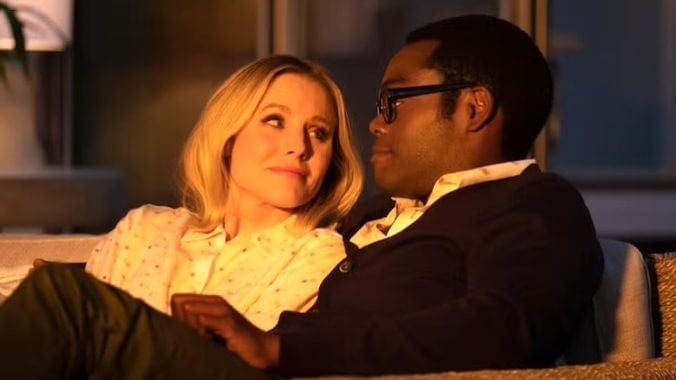That’s All, Folks: The Good Place Asked What We Owe to Each Other
Photo Courtesy of NBC
Most scripted television shows end in cancellation, so there’s something special about the ones that get the chance to go out on their own terms. This year, Ken Lowe is revisiting some of the most influential TV shows that made it to an officially planned final episode. That’s All, Folks is a look back at television’s most unforgettable series finales.

Part of this look back at the most memorable finales to television shows has been to trace an evolution of the medium. TV has not been around for very long, all things considered, and it’s changed rapidly during the short time it’s been one of the dominant forms of entertainment and culture. I would argue that if you shoved every television show together into some average amalgam of all of its storytelling ever, the nonsense show that would result would look mostly like a sitcom. It’s really the distinct genre (in fiction) that has emerged from television as a medium, and it’s incredibly telling that so few notable ones dominate television criticism and cultural conversation today.
The situation comedy is not so called because it’s set in a status quo that never changes, but because the humor in each episode arises from the situation: the French cousin is in town visiting, the health inspector has come by, someone hung up the phone before they got the last crucial bit of info without which they will make a series of increasingly stupid and hilariously bad decisions. People will probably cry foul when I compare The Good Place—the crowning achievement of show creator Michael Schur even in light of his other must-watch series—to a sitcom. It isn’t one, but it arises from them, so much so that the cast’s ringer is played by none other than Ted Danson, the king of sitcoms. The Good Place might be the last word on the genre, and it seemed like the only possible show I could end a yearlong column about finales on, by virtue of the totality of its ending and the fact that it happens to have aired that ending very recently along our current Bearimy.
The Show
Eleanor (Kristen Bell) awakens in a soothing waiting room. “Welcome!” a block of friendly sans serif text on the wall reads, “Everything is fine.” It recalls another show where the characters are trapped in a discrete, enervating place characterized by a particular font. Eleanor is informed that she is dead, but there’s no reason to worry, because she is in The Good Place, essentially a subdivision of heaven designed by architect Michael (Danson) to be the perfect reward for only the very best people who have lived the most exemplary lives on Earth. She is assigned her one true soul mate, moral philosophy professor Chidi (William Jackson Harper), and a house that conforms to the reflection of her true self—weird minimalism and clown paintings everywhere.
Elsewhere in the neighborhood are the soulmate duo of name-dropping socialite Tahani (Jameela Jamil) and ascetic monk Jianyu (Manny Jacinto). Jianyu has taken a vow of silence and Tahani never stops talking. They are attended by the all-knowing helper Janet (D’arcy Carden, MVP of the show), who knows everything, pops into existence whenever she’s called, and can materialize objects ex nihilo. Janet is neither girl nor robot. She shows up in your social media feed right around the second week of each October to remind you that Columbus is in the Bad Place. The Bad Place is real, we learn (because they ask Janet about it) and it is an eternity of savage torment.
All of it seems less-than-ideal if not outright distressing, until the biggest reveal: after getting Chidi to swear he would never do anything to hurt her, Eleanor reveals that there’s been some kind of mistake. She was not a selfless humanitarian, but a total selfish asshole goblin of a person, the sort who insults charity workers and drinks a ton so she never has to be designated driver. She was, to put it succinctly, the worst. And now, her presence in the Good Place seems to be causing some kind of malfunction in the afterlife itself, as random, chaotic events begin to take place.
The solution is simple, Chidi decides: he will instruct Eleanor in moral philosophy in the hope that she can live up to her unearned spot in the Good Place. (Jianyu, it is also revealed, is actually Jason, an absolute waste of space from Jacksonville, Florida who is only pretending to be a Taiwanese ascetic because he’s in the same boat as Eleanor.)
And there The Good Place could have stopped, with however many of its seasons following a familiar, sitcom format: some moral conundrum of the week, beginning with Eleanor completely flunking it before Chidi sets her straight, all while hilarious comedy of errors stuff happens around trying to keep Eleanor’s secret. That is more or less how the first season unfolds, until the even bigger reveal.
Eleanor and the rest of them aren’t in The Good Place. They’re in The Bad Place. Michael is not a benevolent architect but a demon tasked with torturing the main characters, and everybody in the fake Good Place neighborhood (except Janet, an abductee) is in on it.
-

-

-

-

-

-

-

-

-

-

-

-

-

-

-

-

-

-

-

-

-

-

-

-

-

-

-

-

-

-

-

-

-

-

-

-

-

-

-

-









































